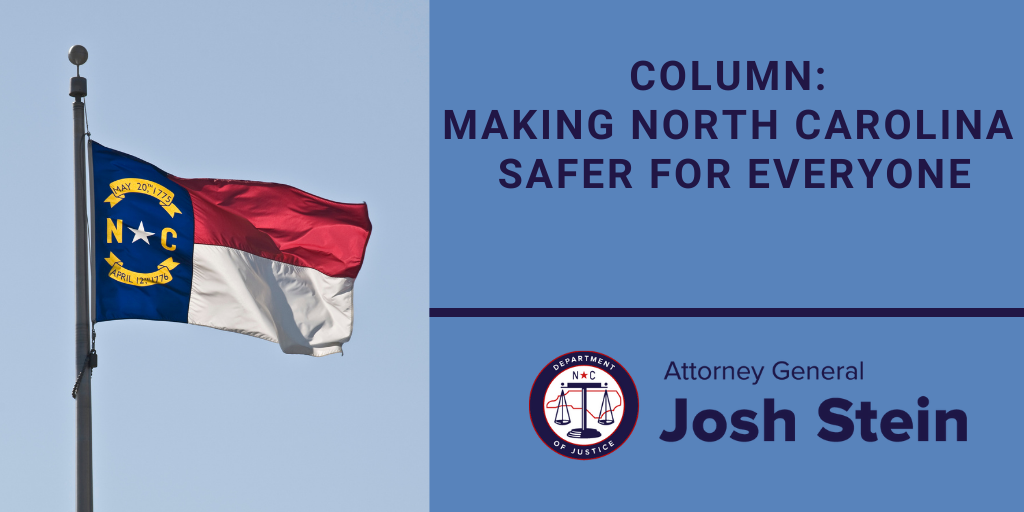
Attorney General Josh Stein
December 2020
In June, Gov. Roy Cooper established the Task Force for Racial Equity in Criminal Justice. I was honored when he asked Associate Justice Anita Earls and me to lead its work. Our charge was substantial: to identify ways to bring about meaningful change in the criminal justice system so that every North Carolinian is safe.
This month, the task force delivered its final recommendations to Gov. Cooper. You can read our full report at ncdoj.gov/trec, but I’d like to share a bit about our recommendations to create racial equity in criminal justice.
Our recommendations fall into two categories: law enforcement and the courts. To achieve equity in law enforcement, we must reimagine public safety so people can get the help they need from community resources long before law enforcement intervention is necessary. We cannot continue to ask our law enforcement officers to be social workers, drug counselors, mental health specialists, and health care providers – all while serving as peace officers. It is simply too much and unfair. If we take non-criminal crises off our law enforcement officers’ plates, they can focus on dangerous crimes and our communities will be safer.
It’s critical that we put guardrails around the use of force – the issue that kickstarted this task force’s creation. The task force makes a number of recommendations to ensure that officers use the minimum amount of force necessary and are prohibited from using neck holds and other high-risk techniques.
We should also think seriously about the offenses that are outlined in our criminal code, especially as they relate to traffic stops and – because you cannot talk about racial equity in criminal justice without talking about drugs – marijuana. The task force recommends decriminalizing marijuana possession – making it a civil infraction, not a criminal violation – and other minor crimes to give law enforcement officers the ability to focus on issues that have a more serious impact on public safety.
We must ensure that law enforcement officers are accountable to the communities they serve. That means creating external oversight and investigation procedures for officer-involved incidents, making disciplinary actions against officers publicly available, increasing transparency around law enforcement video recordings, and establishing higher standards for officers.
And finally, we have to give our officers the best possible training so they are equipped to succeed at their challenging work, have the mental and physical health and well-being to safely perform their jobs, and are committed to serving as guardians, not warriors.
On the issue of racial equity in the courts, we must first eliminate racial disparities that arise before an accused person’s trial even begins. We should adopt restorative justice practices to ensure communities are safer and stronger after crime, and we must address the school-to-prison pipeline that can be devastating for Black youth.
We also have the opportunity to make significant progress on bail reform so decisions about pretrial release are based on the extent of the threat a person poses to their community, not the size of their bank account.
And we must eliminate racial disparities in the trial process by addressing unconscious bias from prosecutors and juries and ensuring that criminal juries better reflect the communities from which they are drawn. We must make certain that people in prison have access to the health care resources and training opportunities they need so they can succeed when they get out of prison, which 95 percent of those incarcerated will one day do. And we have a responsibility to ensure that people are not forever burdened by their bad decisions by addressing excessive fines and fees, criminal justice debt, and driver’s license restoration.
In all, the task force made 125 recommendations to Gov. Cooper – but this is just our first step. We will now get to work to implement these solutions so we can build genuine trust between people who work in law enforcement and criminal justice and the communities they serve. I’m grateful to the task force members and staff who devoted their time and energy to this work for the past several months and to the hundreds of North Carolinians who shared their experiences and ideas with us. We have more to do to bring North Carolina closer to guaranteeing the equality that every person deserves, and I will be working alongside you in that pursuit.
